
Ground Water Canada’s Top 10 Under 40
It’s hard not to feel good about the future of the ground water industry after talking with 10 young people who work hard and love what they do.
In January, Ground Water Canada put out a call to readers to tell us about outstanding young professionals who exhibit outstanding leadership, skill and dedication to the industry.
Readers came through with an impressive sampling of the industry’s best. All of the drillers, service people and scientists you will read about are called upon to expect the unexpected, think on their feet and come up with creative solutions. It’s made me appreciate just how important problem solving is in all facets of this industry.
Enjoy reading about these young folks – and maybe see a little of yourself in them!
THE EDUCATOR
Parker Drury, Drury Well Drilling, Barrie, Ont.
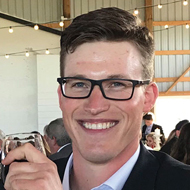 At 27, Parker Drury, has been a driller and installer with his family’s business, Drury Well Drilling in Barrie, Ont., for five years.
At 27, Parker Drury, has been a driller and installer with his family’s business, Drury Well Drilling in Barrie, Ont., for five years.
Father Bob Drury runs the business, which has been incorporated since 1988, making this their 30th year in business. The younger Drury is starting the process of taking over the business and the plan is for him to assume ownership in five or six years.
Drury, who worked a lot of summers during his high school years, studied business administration at Georgian College. After deciding office work was not for him, he worked in the automotive industry for five years, then decided to get into well drilling full time. He first focused on servicing and now drills as well.
Drury Well Drilling, whose territory covers the Barrie area and stops just north of Orillia, does pretty well all residential work, including lots of infrastructure work, rehabilitation and instalment of replacement casing, Drury says.
“I get a lot of satisfaction out of helping people get good, clean water,” he says, “and I learn a lot about other trades.”
His most memorable moments are those “firsts” – first service call, first day drilling. “The big learning curve days,” he calls them, noting that given the amount of time, materials and money at stake, it’s important to learn from any mistakes made.
“Parker is a great example of doing things properly and educating his customers and the public,” said Craig Morgan, Rideau Pipe, who nominated the young driller.
When I ask him about customers, this unearths some passionate ideas. “A lot of people don’t really understand where water comes from or why they have wells or treatment equipment and systems,” he says. “I love to educate people about pressure systems and how to maintain equipment. It helps them in the long term, even though it cuts somewhat into our stream of income.”
They like to use the best equipment. A lot of equipment now has 10-year life; his has a 15- to 20-year life. “A lot of people have trouble cutting that cheque.” But if you amortize the cost over years, it probably works out cheaper. Education helps them understand it’s a good investment. It’s the heart of the home.”
Drury has some advice for those looking to get into well drilling. “It’s good to keep an open mind to learning things,” he says. “Be prepared to work hard, put in long hours and do heavy lifting, he says. But you’ll find it fulfilling. I do.”
Work hard, but work smart, safely, and sustainably – both personally and environmentally,” he says. “Critical thinking is an absolute necessity for this industry whether it’s in pumps and pressure system installation or service or on the drilling side of things.”
If there’s a challenge, it’s in separating work and home life and getting a work-life balance, Drury says. “We do a lot of jobs and I work a lot of late nights,” he says. “Sometimes just stepping away from the work for a bit is a challenge.”
In his spare time Drury tries to get in some woodworking, read, listen to music, and visit friends in the city or at nearby cottages.
But it’s clear he loves the work itself. “Once you’re enjoying what you’re doing, it’s not work anymore.”
BORN TO DRILL
Jordan Lepper, Lakeland Drilling Ltd., St. Paul, Alta.
 At 26, and eight years in, water well driller Jordan Lepper feels good about his choice of career. That has a lot to do with family.
At 26, and eight years in, water well driller Jordan Lepper feels good about his choice of career. That has a lot to do with family.
Lepper works for Lakeland Drilling in St. Paul, Alta., two hours northeast of Edmonton. Established in 1967, it was purchased by his father, Darell, in 1997. Brother Justin, 29, works in the business as a driller as well.
He remembers thinking at age six being keen to drive drill rigs – not tractors, like other kids he knew. At 16, he was sure drilling was for him. That’s about when he started to help his father by sweeping out the shop and helping on the rigs.
Lepper always liked school – and was not short on “book smarts,” having received a Top Apprentice Award from the Alberta Apprenticeship and Industry Training Board in 2014 and the Maurice Lewis Award for top marks at Red Deer College during his second year. But he never seriously considered a career outside of drilling: something drew him toward the industry.
As a driller now, he likes the physical labour of the job, the time spent outdoors and, not to be overlooked, the money. “This industry has allowed us to make a good, honest living,” he says. He also likes the idea of being his own boss one day.
The company’s services include drilling, servicing, repair, and rehabilitation of domestic water wells, as well as agricultural and industrial source wells, geophysical logging, coring and observation wells, and pump work.
But Lakeland’s bread and butter is environmental drilling, Lepper says.Most of their work is in Cold Lake and Conklin, but they also have taken on jobs in Calgary and Drayton Valley. “We go where the work is,” he says.
He remembers helping on a job for Canadian Natural Resources Limited Horizon in Fort MacMurray when he was just 18. “I got to drill a well at the bottom of a mine.”
“I know it sounds cliché, but I take in something new every day,” Lepper says. “I take as much info from everyone as I can. I listen to everyone.”
Working in the family business has brought the family a lot closer together, he reflects. “I didn’t see a lot of my dad as a child,” he says. “If you look at it in that way, you stay positive, even on a bad day.”
Lepper and his wife, Kennedy, have a three-year-old daughter, Arie, and another child due in the fall. He enjoys spending time with them and says Arie is “into everything.” He says with a laugh, “She’s payback for how I was with my mum.” He also likes to play hockey and hang out with friends.
“It’s been a winding road of learning,” he says. Thinking back on his early days as a driller, he recalls being led astray by “thinking I knew something I didn’t.”
“Know what you don’t know,” he says.
SEEING A JOB THROUGH
Fraser Cummings, hydrogeologist, MTE Consultants Inc., Kitchener, Ont.
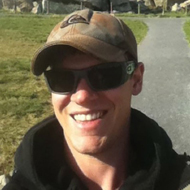 Fraser Cummings, 28, has been a hydrogeologist with MTE Consultants Inc. in Kitchener, Ont., for four years.
Fraser Cummings, 28, has been a hydrogeologist with MTE Consultants Inc. in Kitchener, Ont., for four years.
“I always liked nature and being outdoors,” Cummings says. “I remember in high school thinking I wanted to do something related to the environment and that’s how I got into earth science.”
He earned his undergraduate degree in earth science and a master’s in hydrogeology from the University of Waterloo.
The young environmental scientist divides his time between field and office. In the field, he often focuses on pits and quarries, taking water levels from monitoring wells, performing hydraulic conductivity testing and taking samples from those wells. Some days he is on site to supervising drilling of those wells.
Back in the office, he completes hydrogeological assessments, writes reports from data gathered in the field or submits applications for permits to take water for clients.
“I like the mix,” he says. “It’s satisfying to go from collecting the raw data to assembling it in a report to coming out with a final product that I was involved in from the beginning to the end.”
From day to day Cummings is motivated to excel by the professional geoscientist designation (P.Geo) he earned a year ago, because it reminds him of what his work means. He also feels motivated by the people he works with. “I want to make sure I’m doing the best I can so that if someone else looks at it that they’re seeing good results,” he says.
Working with drillers, he has learned to pay attention and to ask lots of questions. “They know if the rig is drilling and smoothly and if it’s drilling in hard bedrock or cobbles. I try and make sure I’m paying attention and ask them ‘What kind of soil are we in now?’ ‘What does it feel like?’ ‘Can you feel when the soil changes?’ ” Cummings says.
“Fraser interacts regularly with rural private well owners on projects we work on related to gravel pit and quarry development and monitoring. His quiet but confident approach puts the well owners at ease when meeting with them to discuss their well specifics and the benefits of allowing him to inspect their well and assess it for potential long-term monitoring. Fraser’s knowledge of hydrogeology, combined with the time he spends with rural well owners, has also equipped him to effectively interact with the general public at potentially stressful public open houses or town hall meetings,” says supervisor and mentor Peter Gray, who nominated him.
Cummings says he learned a lot from Gray. “One thing I’ve learned from Pete is that there is a difference between being a boss and being a leader,” he says. “Pete’s very much a leader. It’s about working as a team: as a team we can accomplish a lot more than one person trying to do one thing at a time. If there are complications, it’s our job is to solve those problems and come to a solution without dwelling on the past.”
One thing he likes about his job is that, from his first day, he felt his opinion was valued even though he didn’t have the experience other team members had. “I’ve always felt free to speak up if I had an idea or needed a question answered. My opinion has always been heard.”
When he’s not on the drilling site or crunching numbers, Cummings likes to spend time with wife Arissa and daughter Hailey, who will turn two in October. He also plays baseball and ultimate frisbee.
Young people thinking of entering the industry should enjoy working outside and be able to “go with the flow” and solve problems when things don’t go as planned, he says. “Problems are going to come up and you just have to remain calm and solve them as you go.”
FROM FIELD TECH TO TROUBLESHOOTER
Justin Clarke, Maxim Environmental & Safety Inc., Mississauga, Ont.
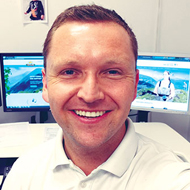 Justin Clarke has been around the ground water industry all of his life. Now 36, the sales manager at Maxim Environmental & Safety Inc., in Mississauga, Ont., cut his teeth doing field work and gaining hands-on experience that would serve him well in helping customers through challenging situations.
Justin Clarke has been around the ground water industry all of his life. Now 36, the sales manager at Maxim Environmental & Safety Inc., in Mississauga, Ont., cut his teeth doing field work and gaining hands-on experience that would serve him well in helping customers through challenging situations.
Clarke started at the age of 10 working as a field assistant on weekends and professional development days for his father, hydrogeologist Bill Clarke, at Waterloo Geoscience Consultants Ltd., a consulting firm. He was hired full time with in 2004 and remained in the consulting business until 2012.
Following his field work, he joined Heron Instruments’ team for one year before going to work at Maxim, a company that sells, rents and services environmental monitoring and sampling equipment.
These days, Clarke may be found not in the field but in a bustling office, headset donned, handling orders in the early morning, followed by a steady stream of calls and emails from consulting firms and small businesses in the field. He works with a team of about 10 staff solving equipment and situation problems. “All troubleshooting is done over the phone, and that’s good because clients can send us a photo,” he says. “So I have a visual of what’s going on but I also have all service manuals and all online tools at my disposal to solve the problem.”
He remembers vividly one noon hour he was asked by a client in Thunder Bay – a 14-hour drive away – to deliver equipment the same day. With the situation urgent due to a spill that threatened the environment, the team put the equipment on the next flight from nearby Pearson airport and had the equipment in Thunder Bay around suppertime. “Situations like that are the best way to develop trust with clients. You realize you can do anything!”
Clarke likes the close-knit nature of the industry. He recently served as a representative of suppliers for the Ontario Ground Water Association and encouraged his company to join as a member for networking opportunities and to help build awareness of the organization.
“The OGWA has the best intentions for the industry,” he says.
ÂÂ Clarke can’t say enough about this industry as a career path. “There aren’t a lot of careers with the pay and the benefits that let you be outdoors and benefit from being outside and experiencing your town or city or province,” he says. “So much of the industry is driven by cleaning up the province because real estate values really drive the economy. You’re turning land that was originally an industrial property into land that is safe and usable again. Knowing that I’m assisting the environmental effort is a really big deal for me. There’s that larger picture to it – it’s not just a paycheque, it’s not just my career.”
“As a result of his extensive field experience, Justin takes particular satisfaction from troubleshooting with young field technicians who work for one of several consulting firms who represent Maxim’s growing clientele. Justin’s technical knowledge is broad and varied, as he attends technical manufacturers’ workshops so that he can be adept with the newest environmental monitoring equipment,” said father Bill Clarke, who nominated him.
When home in Smithville, Ont., in the Niagara region, Clarke savours time with wife Tracy and daughters Emmalynn, 4, and Aubrey, 1.
“Right now I am just embracing being a dad,” he says. “I’m doing something I’m really proud of and I get to come home happy every day.”
LEARNING EVERY DAY
Ashley Friesen, Friesen Drillers Ltd., Steinbach, Man.
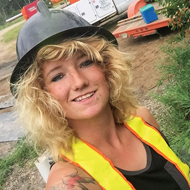 Ashley Friesen, 23, was on a job in Swan River, Man., about two hours south of The Pas, when I caught up with her during a 24-hour pump test.
Ashley Friesen, 23, was on a job in Swan River, Man., about two hours south of The Pas, when I caught up with her during a 24-hour pump test.
Friesen, a well technician for her family’s company, services wells. “There is no typical day because on any given day you could end up doing any task.” In addition to pump testing, she carries out well rehabilitation, well abandonment, pump installation, water sampling, grout work and myriad tasks relating to keeping wells healthy. “There’s a lot of on-call work in this job,” she says. “It’s definitely interesting.”
When Friesen started in an entry-level job as a driller’s helper six years ago, she did not see herself continuing in the industry. “I didn’t plan to stay in it,” she says.
She tried her hand at service work, and since 2015 she’s focused on her work as a well technician, assisting several drilling crews.
One perk of her job is getting a chance to see some of the country. “I like the travelling I get to do,” she says. “I’ve been to Ontario, Saskatchewan and Alberta.”
She also enjoys learning about what other tradespeople do and picking up new skills.
For example, she now has experience using a cable tool and a down-the-hole camera. The camera is housed in a former ambulance custom fitted to protect the delicate, expensive equipment, she explains enthusiastically. “The vehicle is wired up and a person can sit in the back and control the camera.”
The camera is beneficial to clients to see if screens are plugged or fractures are open enough or whether they need rehabilitation using a cable tool, she says. “It helps you see if there’s any point in fixing the well.”
She says the worst days are when she is in the shop all day, doing jobs that need doing such as stocking the truck or doing oil changes. “Those days can drag.”
As a woman, Friesen comes up against a couple of challenges. Although treated equally by all staff, she occasionally has to convince a skeptical customer she can do the job, she says. Also, the physical nature of the work can be difficult. “I sometimes struggle with lifting heavy things,” she says. “It’s definitely challenging.”
She tries her best to help create awareness of the industry by talking with well owners and educating the general public. “People don’t know anything about water wells,” she says. “They don’t understand where their water comes from. There needs to be a Hollywood movie about water well drilling.”
She recounts pulling out 200 feet of pipe from a well, to the surprise of the well owner, who had no idea how deep a well could go. “When people see drillers at work, they sometimes ask if they’ve struck oil. Sometimes I’m not sure if they’re serious or not,” she says.
When not troubleshooting wells, Friesen loves to get out and hike. Manitoba’s Hunt Lake is a favourite spot. She recently camped in Ontario and loved it: “What’s not to love? It’s lakes, and trees, and rocks.”
Near the end of our chat, Friesen reflects that a water well is like a car. “You wouldn’t buy a car, then not take care of it,” she says. “You have to give it a little TLC.”
‘ALWAYS A THRILL’ TO HIT WATER
Jason McLeod, McLeod Water Wells Ltd., Strathroy, Ont.
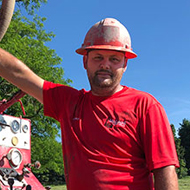 It’s great to see a successful, independent family business operated with pride. I knew that was the case when I read Lisa McLeod’s nomination of her husband, Jason.
It’s great to see a successful, independent family business operated with pride. I knew that was the case when I read Lisa McLeod’s nomination of her husband, Jason.
“He has worked hard to build an excellent reputation for himself as “an honest, fair and a very skilled driller,” writes his business partner and office administrator.
McLeod, 39, has been president of McLeod Water Wells based in Strathroy, Ont., for 12 years.
With Lisa, he operates the water well drilling business, which drills and services wells in southwestern Ontario.
“Customers and associates call him “The Well King” because of his success in finding water in some areas where it’s tough to find, she adds.
McLeod Water Wells has developed into a fleet of three drill rigs, three support trucks, pump service vehicles, mini-excavator and a dedicated team of 10 employees.
“He has built a successful company from the ground up and continues to grow with the industry, implementing new technology and drilling practices. He is liked and respected by both his employees and fellow contractors,” Lisa writes.
McLeod graduated from the Drilling and Blasting program at Fleming College in 1998. After plans to purchase an existing drilling business fell through, and with encouragement from family and friends, he “took the leap of faith” to start his business from scratch in August 2006 and purchased a 1978 TH55 Ingersoll Rand drill rig and support truck from a seller in Michigan.
There is a family connection to the industry as his uncle Ralph McLeod drilled in nearby Ingersoll until retiring a few years ago.
McLeod remembers his first exposure to water well drilling as a young teenager, watching water well contractor Leonard Farr drill a well.
“I like working with my hands, I like working outdoors. What I like about this job is that you never know what to expect.”
They do a variety of jobs, including lots of irrigation wells, he says.
The McLeods credit their employees – especially longtime driller and business partner Wes Mitchell – with playing a big part in their success.
McLeod, who has been an active member of his association for 11 years, appreciates the opportunity to learn every day. “I try to learn something from everyone I meet. Everyone has something to offer,” he says. “So if I do a task or technique, it’s not just me doing it but me fitting what I’ve learned from others into what I do. It really is.”
When not working he enjoys moose hunting near Thunder Bay and, closer to home, fishing. In fact, short on free time, he built and stocked a pond in the backyard to enjoy the hobby.
The couple have three children: Tyler, 10, Adam, 9, and Chelsey, 5. The older boys have shown interest in the family business: Adam helps around the shop, and Tyler for his 10th birthday asked to go drilling with his dad. “We brought him in just before we expected to hit water,” McLeod says.
“I’m always excited when we hit water,” he says. “I could do this 100 times and it’s still always a thrill.”
Correction: The print version of Jason McLeod’s profile in our Fall 2018 issue incorrectly states that Jason purchased his drill rig and support truck from his uncle, Ralph McLeod. In fact, he purchased the rig from a seller in Michigan. Ground Water Canada regrets the error.
FOURTH-GENERATION DRILLER
Patrick Simonson, JH Simonson Well Drilling Ltd., Centreville, N.B.
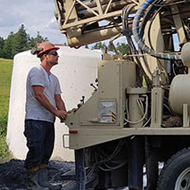 At 38, Patrick Simonson is a fourthgeneration water well driller for JH Simonson Well Drilling in Centreville, N.B., near the border with Maine. The business was started in 1921 by his great-grandfather, Harry, and grandfather, Jack, and incorporated by his father, Jim, in 1983.
At 38, Patrick Simonson is a fourthgeneration water well driller for JH Simonson Well Drilling in Centreville, N.B., near the border with Maine. The business was started in 1921 by his great-grandfather, Harry, and grandfather, Jack, and incorporated by his father, Jim, in 1983.
The youngest Simonson started helping out around age 12 or 13, but started working in the family’s business in earnest in his early twenties, when his father, looking to retire, needed a hand. Jim retired in 2003, and though he still occasionally pops by to observe local jobs, he is enjoying more leisurely pursuits of hunting and fishing. He never worked with his grandfather, Jack, who was getting out of the business as the youngest Simonson was becoming interested in drilling.
It’s a small business, with just Simonson and one employee on staff. They serve customers from Grand Falls to Nackawic, drilling wells, selling pumps and offering UV light treatment.
“We do everything,” he says, adding that about half the business is selling pumps.
“I like that the work is different every day: some days you drill half the day, then run the roads delivering pumps.”
Canada being the big country it is, Simonson has found the notion of offsite learning helpful. Years ago, after challenging the licensing exam and missing it by a question or two, he took the one- to two-year course remotely through Red Deer College in Alberta and passed. He found it a helpful experience, although “there was lots of stuff on the test that we don’t typically use like cable tools, mud rotary.”
Because the ground in his region is bedrock, the company uses a Ingersoll-Rand T3W down-the-hole hammer.
If there’s aspect of the job that can be a challenge, it’s the sheer complexity of government regulations, he says. “You know what you’re doing, and it’s sometimes hard having government standing over your shoulder.”
He and his wife Brandie have two young boys, Jack, 7, and Emmett, 3. When he’s not watching Jack play baseball, Simonson enjoys snowmobiling, four-wheeling and fishing out of the river that runs along the back of their property, a tributary to
the St. John River.
The Simonsons believe it’s important to do their part for the industry. Jim was president of the Atlantic Water Well Association for several years, and Patrick is looking forward to the convention in Truro in September. He finds the meetings and shared information very helpful. “We’re remote. They give us prices, tell us about new plumbing codes coming in.
They keep us well up to date.”
All in all he likes the work. “You have to work hard, try to keep everyone happy, because bad news travels fast,” he says. But it’s satisfying when he can help out a customer. “Some people are very grateful and will like you for the rest of your life for giving them water.”
READY FOR ANYTHING
Patrick Houle, Houle Well Drilling, Noelville, Ont.
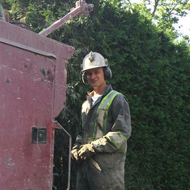 Pat Houle, 27, has been a driller and installer with the family business, Houle Well Drilling in Noelville, Ont., for seven years.
Pat Houle, 27, has been a driller and installer with the family business, Houle Well Drilling in Noelville, Ont., for seven years.
Started by Houle’s grandfather, Omer Houle, in 1961, the business has served the French River, Parry Sound, Sudbury, North Bay and surroundingarea for more than 50 years.
Pat Houle worked summers as a teenager for his dad and grandpa, beginning with handing them tools. I didn’t set out to be in well drilling, but it just grew on me.”
His first idea was to be an engineer, but after two years of university and the realization his chosen field might not allow him to work outdoors as much as he’d like, he told his dad he’d like to join the family business. He began by learning on the job by trial and error, then took the two-week course through Fleming College to on the road to becoming licensed.
He’s never looked back. They do a little of everything – drilling new wells, servicing existing wells, pump
sales – mostly on the residential side, he says.
Houle says he likes how happy customers are when they learn they have good water. “People take it for granted,” he says. “I would say at least 50 per cent of my job involves educating the public.”
On one of his more memorable jobs, he recalls telling a well owner their well was good and they’d no longer have to bring in pails of water from a relative down the road. “That felt good,” he says.
“Pat is a great example of caring for the industry and customer,” said Craig Morgan, Rideau Pipe, who nominated him.
What Houle finds challenging about the job is also what he likes best about it. “It’s a double-edged sword. You have to be ready for anything. You could drill 100 wells and they won’t be the same. So much has to do with how the formations change.”
If you don’t like solving problems, it’s not a great choice of career, he says. “It’s hard work, with long hours, but it’s worthwhile.”
Houle is in the process of taking over the business from his father, Richard, who is still in on hand in the field to offer advice. “He has all but retired. He’d like to be fully retired,” his son says with a chuckle. His mother, JoAnne, works in the office. It’s a small business – four employees in all.
When not working, he enjoys outdoors pursuits including hunting, fishing and, during the long winters in northern Ontario, snowmobiling and ice fishing.
REMOTE CHALLENGES
Thomas Williams, Red Williams Drilling Ltd., Parksville, B.C.
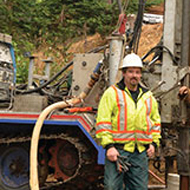 Thomas Williams, 34, is operations manager for Red Williams Drilling, the namesake company owned by his father.
Thomas Williams, 34, is operations manager for Red Williams Drilling, the namesake company owned by his father.
Officially, Williams started drilling in 2003; unofficially, he’s been in the business most of his life.Williams the younger didn’t always want to be a driller. He had studied at Malaspina University-College to be an auto mechanic when he decided to shift gears and join the family business.
He likes the work, he says, adding that there is enough mechanical and maintenance work attached to water well drilling to satisfy his interest in all things mechanical.
Most of the company’s jobs fall within 300 kilometres of the shop in Parksville, including Qualicum Beach. They do work related to fish farms, commercial and residential irrigation, water treatment, fusion HDPE, water delivery and pump service and repair.
About 20 staff carry them through their busy season, including two pump crews, two drill crews.
Williams works in the oil patch during the winter and he enjoys the change of scenery. He recently spent four months in Norman Wells, N.W.T., working for ConocoPhillips. Among other things, he took samples and checked that fracking wasn’t affecting the ground water. He also enjoys the chance to meet drillers from across the country, noting he recently got to know some drillers from Newfoundland.
Working along the southwest coast of British Columbia in itself provides a lot of diverse working conditions. “It’s something different every day,” he says. He recalls an interesting job he worked on recently drilling geothermal wells – one 600 feet, another 400 feet – into a mine shaft for Vancouver International College. They used a 150-horsepower pump, and he is looking forward to being on hand for the firing up at the end of August. “It’s a unique project,” says Williams, who had done roughly one dozen geothermal jobs before tackling this one.
Drilling is a demanding job with long hours and seasonal work, says the young driller, whose favourite aspect of the job is working in challenging conditions in locations that are hard to get to. For that purpose, they have a smaller, limited access rig that drills about five feet at a time as opposed to the 20 feet a larger rig would typically drill. He is going to Nimmo Bay this fall to complete one such job. The resort on Mount Waddington will be changing its water source from surface water to ground water, a process he expects to take about a week. He flew up earlier this summer – and back again the same day – to size up the location and requirements.
Well owners have been generally slow to register their water wells, as required by the relatively new ground water regulation. Although as a driller he is not involved in the licensing process, he is on the ground educating people on well registration requirements and often helps walk well owners through the process. Registration is “not the most straightforward,” he says.
While some customers are more interested in the drilling process than others, Williams is always mindful of the customer’s point of view. “For some people, drilling a water well is the biggest gamble they’ll make in their lives,” he says.
For fun the young dad of four enjoys dirt-biking, snowmobiling and generally being outdoors with his wife, Nestle, Lily, 11, Andrea, 9, Anna, 7 and Kaiden, 4. Recently they were able to join him in a cabin in Shoal Bay. “It’s nice when that happens,” he says.
THE PROBLEM SOLVER
Kamal Singh, NCS Fluid Handling Systems, Surrey, B.C.
 Kamal Singh, 39, has worked for 25 years on commercial and industrial projects involving specialty water and fluid pumping – all of them related to ground water. This is an amazing fact in light of his age.
Kamal Singh, 39, has worked for 25 years on commercial and industrial projects involving specialty water and fluid pumping – all of them related to ground water. This is an amazing fact in light of his age.
Singh has been vice-president of design and engineering at NCS Fluid Handling Systems for nearly three years. He has expertise in system rentals, sales and service of industrial pumps, hydraulic calculation, system design, risk mitigation, environmental disaster response, and mechanical troubleshooting, writes NCS president and CEO Owen Gilbert, who nominated Singh for the Top 10, adding that he’s worked in the oil sands in northern Canada, the construction market on the
Pacific coastline and the northwestern U.S., and the mining industry in central Canada.
“Kamal has proven to be a resourceful, strategic and confident leader with strong planning and organizational skills,” Gilbert writes. “Years of operational knowledge have contributed to a well-developed problem-solving skillset that incorporates an engineered approach in combination with a people-oriented management style.”
Singh has a bachelor’s degree in mechanical engineering, a master’s of business administration, his Association of Engineers and Geoscientists of British Columbia designation, and his Green Belt Certification in the Six Sigma program at the University of Michigan. But it’s his practical experience and analytical approach to real-world situations that distinguishes him.
Singh, who was born in Delhi, India, but moved as a child moved with his family to British Columbia, learned about pumps from his father, who manufactured positive displacement pumps and filters for companies that produce edible oils.
Engineering degree in hand, he went to England to work for ITT Corporation on retrofit ballast pumps in First and Second World War ships. Singh was sent into the ballast – “the dungeon” – with measurements and drawings to try to retrofit the pump to the original specifications. His career was off to a flying, or floating, start.
From there he took a position in Winnipeg. “I started off in ITT’s ground water division in Winnipeg, which was basically ground water control and sewer bypasses.” He grew the division, in a region that stretched from Thunder Bay, Ont., to Saskatchewan.
On first venturing into sales, he wasn’t sure it was for him, but it’s worked out well as he is called in on more complicated jobs where an engineered solution was required. He enjoys coming up with customized solutions to solve clients’ problems. “To get into this industry, just answer your phone. Somebody has a problem – and if you can put your head into it and find a solution, you are it,” he says.
As for memorable days on the job, Singh has a doozy. In 2009, he and the NCS team were asked by Hollywood moviemakers to stage a scene in the movie Marmaduke in which Los Angeles is flooded and the Great Dane is involved in a rescue. Filmmakers wanted to shoot realistic special effects, so Singh and his team created an artificial pool using 1100-horsepower pumps.
The next day he was called back to help solve a problem: they needed the water warmed to the temperature of 15 degrees required by the insurance company for the dogs’ health. They brought in a heater, emptied the pool, heated the water, and refilled the pool. They were then asked to create turbulence. Stability balls at his gym provided the inspiration for Singh’s
solution of securing these balls to the bottom of the pool using a net.
When his mind is not on pumps, Singh enjoys skiing and collecting vintage cars like the 1965 AMC Cobra. He and wife Jasmit, who met at the University of British Columbia, have a young son.
He likes the feeling when you sort out a problem. “It feels amazing when you’ve sorted out something for a client that no one else wanted to touch. We try to test the limits of engineering. People think they have the solution, but we take the butterflies out of the stomach. That’s our job.”
